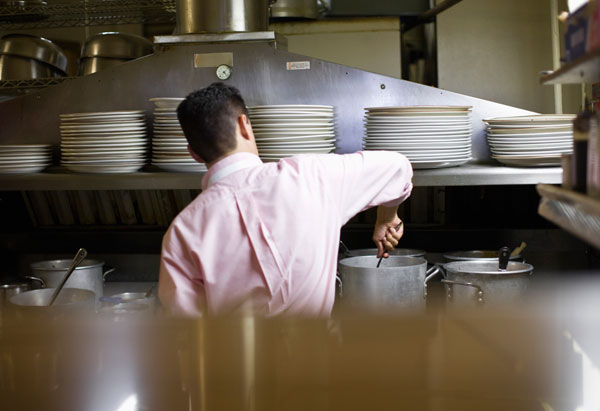Shocking Restaurant Secrets—Exposed!
Dr. Oz explains what could be making you sick, and how you can protect yourself when eating out.

Photo: Thinkstock
When you're dining out, you shouldn't have to worry about putting your health at risk. But certain restaurants and food choices could be doing just that. From the most frequent food offenders to the restaurant violations threatening your health, learn the confidential kitchen secrets that could make you sick.
Most restaurants never wash their lemons. They stay in the box that they were shipped in until they end up on your plate. In an independent test, Dr. Oz discovered five out of five lemons from five different restaurants were coated with germs including mold, bacteria, staph and Candida yeast—the type found in the mouth and vagina.
Solution: Always order your lemons on the side and squeeze them into your drink or onto your plate yourself. Make sure that the juice doesn't touch the germy lemon rind.
Although it may seem counterintuitive to associate a restaurant's bathroom with their kitchen, these two places often share the same level of cleanliness. If a restaurant can't be bothered to keep the toilets and sinks clean, then imagine what their refrigeration and workspaces look like in the kitchen.
Solution: Do not eat at a restaurant where the bathroom trashcan is more than half full. This means the bathrooms are not being regularly monitored and cleaned.
Next: Why the daily special actually isn't that special
Secret: Restaurant lemons are often as dirty as the floor.
Most restaurants never wash their lemons. They stay in the box that they were shipped in until they end up on your plate. In an independent test, Dr. Oz discovered five out of five lemons from five different restaurants were coated with germs including mold, bacteria, staph and Candida yeast—the type found in the mouth and vagina.
Solution: Always order your lemons on the side and squeeze them into your drink or onto your plate yourself. Make sure that the juice doesn't touch the germy lemon rind.
Secret: A dirty bathroom means a dirty kitchen.
Although it may seem counterintuitive to associate a restaurant's bathroom with their kitchen, these two places often share the same level of cleanliness. If a restaurant can't be bothered to keep the toilets and sinks clean, then imagine what their refrigeration and workspaces look like in the kitchen.
Solution: Do not eat at a restaurant where the bathroom trashcan is more than half full. This means the bathrooms are not being regularly monitored and cleaned.
Next: Why the daily special actually isn't that special
Secret: Buffets are breeding grounds for bacteria.
Part of the danger of buffets is that the food sits out at inconsistent temperatures. The food on the bottom is burnt, while the food on the top is too cold. Additionally, you don't always get real ingredients at buffets. A recent test from West Virginia University concluded that scrambled eggs from two restaurant buffets were not made from real eggs. Instead, the samples were made from liquid egg substitutes containing less protein and more water.
Solution: If you want to eat at a buffet, go when it first opens to ensure the highest quality of freshness. For for lunch, aim for noon, and for dinner, go at 5 P.M.
Secret: The daily special is often a bad choice.
Restaurateurs know that many diners will order a special, and consequently raise the price. Sadly, the daily special may not actually be special; they are usually made of the food the chef needs to get rid of quickly. This includes aging meat and fish, old veggies and leftover sauces—all of which could cause a nasty case of food poisoning.
Solution: If the day's special appeals to you, don't be shy about asking the waiter questions about the ingredients.
Next: What could be masquerading as your breaded veal
Secret: Veal is often actually pork.
Veal is expensive meat; often, restaurants will swap it out for pork. Once the meat is pounded and slathered in breadcrumbs and sauce, only a discerning diner can tell the difference.
Solution: Ask for veal to be grilled and never breaded. It's healthier and you can more easily assess the quality of the meat.
Secret: All-you-can-eat deals contain low-quality foods.
When it comes to food, you get what you pay for. Anything that's all-you-can-eat is usually either low quality or food made from starch or heavy in fat.
Solution: If you want to get an all-you-can-eat option while dining out, order pasta, grains or veggies; avoid any meat.
Secret: Decaffeinated coffee masks as caffeinated coffee.
If you order coffee past 8 P.M., it's likely to be decaffeinated. Restaurants don't want to wash two pots so they often use one and fill it with decaf. It saves them time and money to serve only one option.
Solution: If you need caffeine, order an espresso or cappuccino. Because these options are made when you order them, there is a better chance they are caffeinated.
More on Eating Well While Dining Out



